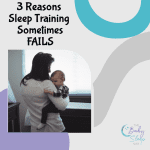
I’ve always thought the term “separation anxiety” wasn’t an adequate one. It sounds kind of clinical and dull, in my opinion. But those of us whose babies and toddlers have experienced separation anxiety (and I’m guessing that’s almost all of us) know that the separation anxiety is anything but dull!
So maybe a term like “separation red-faced-screaming-panic-attack” would be more appropriate? Just throwing it out there. 😉
At any rate, separation anxiety is the topic of today’s article. Specifically, we’ll look at why and when separation anxiety occurs, how it affects sleep, and what you can do to cope with it.
Don’t Worry, Separation Anxiety Is Normal. (In Fact, It’s a Good Sign!)
It might not seem normal for your baby or toddler to cling to your legs, spider-monkey style, and scream until they turn purple, but don’t worry — it’s very normal indeed!
In the first few months of your baby’s life, he’s really not able to distinguish between adults. One caregiver looks and feels much like another. That’s why most newborns and young infants are content to be passed around between adults. Beginning around 7 or 8 months, however, your baby will start being able to tell one adult from another. She’ll also start to become more attached to mom and dad. In this way, separation anxiety is actually a good sign. It indicates that a baby is forming strong, healthy attachments to her parents.
What’s more, at this age, your baby’s starting to develop the concept of object permanence. In the early months of life, babies don’t understand object permanence. Once an object (or a person) disappears from their line of sight, it’s simply gone, in their minds. (This is why peek-a-boo tends to be endlessly fascinating for young babies. From their perspective, you’re performing the most incredible magic trick imaginable!) But around 7 or 8 months, babies begin to understand that objects and people they can’t see still exist — they develop object permanence. So when you leave the room, your baby understands that you still exist somewhere and that you can return. Again, in this sense, separation anxiety is actually a positive sign — it lets parents know that their baby understands object permanence.
Nicole’s Note:
“As usual, don’t be alarmed if your baby doesn’t follow the books on this one. My sons were NEVER babies who could be passed around the party! Ever. They didn’t even really go to grandma and grandpa. Not even when they were a couple of weeks old! I don’t know why. I think, somehow, they DID distinguish us from other adults. Somehow. Even with our nanny, who was there on day one with our second-born, he would not go to her until a week or two later and we had to ‘work’ at it. He went to me and his Dad and that was it. He was literally born that way. And, he was the ‘easier’ of the two. Ha! They have both been shy with strangers from the beginning, but now that they are older, they are soooo different! So, if your baby has always seemed to only want you, foster the security in the relationship and the confidence will come.”
What Is Separation Anxiety, and Why Does It Happen?
Separation anxiety starts in the infant stage — somewhere between 6-10 months, for most babies. You may start to notice that your baby clings to you and cries before you leave her with a babysitter, or at naptime and/or bedtime. Often, separation anxiety appears out of the blue — your baby is fine one day and is a clinging, sobbing, terrified mess the next. This is understandably unnerving for a lot of parents!
Separation anxiety rears its head most often when parents are transitioning their babies into daycare, or into the babysitter’s care. But separation anxiety also affects sleep. It can do real damage to a baby’s nap schedule, and it can cause even the best sleeper to start waking frequently at night. And this makes sense. A baby who’s deep in the throes of separation anxiety certainly won’t want to be left alone to nap or to sleep all night. In fact, separation anxiety can be one of the major factors involved in the 8/9/10 month sleep regression.
A Look At Your Toddler’s Separation Anxiety, and How It Affects Sleep
It’s normal for your little one’s separation anxiety to wax and wanes during his toddler years. It may be better at some points and worse at others. (Of course, if your child’s separation anxiety hangs around full-force throughout toddlerhood, that’s normal, too!) Many parents find that separation anxiety resurfaces in a big way around 18 months (coinciding with the 18 month sleep regression) and again around age 2 (again, coinciding with the 2 year sleep regression).
Just as it did in infancy, separation anxiety can really wreck your toddler’s sleep and sleep training your toddler. And it may be even harder to deal with the naptime and bedtime drama this time around since your toddler’s separation anxiety will often manifest as full-blown temper tantrums. Naps may become royal battles. And you might find that your toddler starts fiercely resisting bedtime or crying for you repeatedly during the night.
Some Separation Anxiety Do’s and Don’ts: How To Handle Your Baby or Toddler’s Naptime and Nighttime Separation Anxiety
Yes, separation anxiety’s perfectly normal — and from a developmental standpoint, it’s actually a good sign! But that’s hardly comforting when you’re facing your third week of sleepless nights and microscopic naps, right?
Not to worry — we have tips! These won’t banish separation anxiety forever (it’s a developmental milestone, after all), but they will help to minimize the effects of separation anxiety and make it easier to handle for everyone.
- DO develop a good bedtime routine. If you haven’t already, work to create a soothing bedtime routine for your baby or toddler. This will help her relax before bed. It will also provide the kind of consistency and predictability that she needs to feel safe.
- DO keep things light. The last thing a parent wants to do is make their child’s separation anxiety worse. But many parents do just that without realizing it. When you put on a worried and anxious face, or when you cry along with your child, you simply reaffirm to your little one that bedtime is, in fact, terrifying, and that he has every reason to be afraid. Instead, work to keep things light and calm at bedtime and nap time. If you seem relaxed and confident, it’ll help your baby or toddler feel that way, too.
- DON’T try to sneak away. Parents, this is a big no-no. Yes, in the moment, it seems easier to simply wait until your baby or toddler is drowsy or distracted and then slip out the door. But in the long run, it just makes things worse. It adds to your child’s fear and uncertainty because now, he’s learned that if he so much as looks the other way, you might literally vanish. Instead, say good-bye (lovingly and firmly) when leaving your baby with a babysitter, and then let your child see you walk out the door.
- DO comfort your child when she needs it, but DON’T create new (bad) habits. If your baby or toddler is wailing at naptime, or wakes in the middle of the night sobbing and screaming, feel free to comfort her. This is reassuring for your little one. It lets her know that you’re nearby. And it’s reassuring for you, too! However, keep these interactions relatively short and boring. This is not the time to read books, or to sing songs, or to play games. What’s more, make sure that when your comforting is done, you leave. Remember, you don’t want to create bad habits during this phase, so now isn’t the time to start sleeping on your child’s floor, or sitting in a rocker next to her bed.
For more information about separation anxiety, and to learn how it’s different from the more serious Separation Anxiety Disorder, see Dr. Kaylene Henderson’s excellent post on the topic over at her website, Little Children Big Dreams.








